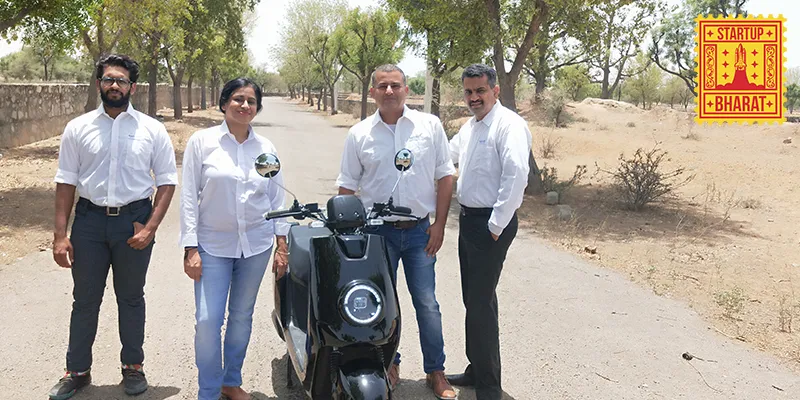[Startup Bharat] Telecom industry veteran chooses EVs to make a difference
Jaipur-based smart electric scooter startup BattRe uses IoT (Internet of Things) to connect with a smartphone app and stores all vehicle-related data online.
Having worked in the telecom industry for close to a decade, Nischal Chaudhary saw the impact of the sector on the social and economic fabric of the country first hand. Hence, when he decided to turn to entrepreneurship, the idea of making a strong impact was high on his agenda. And the sector he zeroed in for that was mobility.
“Just as telecom has accelerated growth across the country, electric mobility will bring down mobility costs rapidly and take India on a different growth trajectory. Moreover, the government gearing up for a push for electric mobility usage along with a strong manufacturing aspect will play a major part in this domain,” says Nischal.
He started BattRe in Jaipur in 2017, manufacturing e-cycles to gauge consumer demand and understand the space. Soon, learning more about the market, BattRe forayed into electric scooters.
“When I spoke to a number of people regarding electric vehicles, many would refer to them as ‘batterywali gaadi'. So, I coined the name ‘BattRE’, with RE standing for renew/renewable energy. The idea is to have a quick recall for the brand and I am hoping that BattRE becomes a generic name for electric vehicles,” he says.
In the last two quarters of 2018-19, the company’s revenue from e-cycles stood at Rs 27 lakh, the smart scooter is still in its pre-revenue stages and will be launching later this year.

Core team of BattRe
The workings of the scooter
The BattRE e-scooter uses Internet of Things (IoT) to connect with a smartphone app to store all vehicle-related data. Using the app, a customer can locate the nearest charging station, and also predict maintenance-related requirements. The e-scooter owner can also send service requests through the mobile app.
The scooters run on lithium ferro phosphate batteries, providing superior performance and longer operational life. The batteries of the e-scooter can power it for about seven years, claims Nischal. It is detachable, and the 10 amp charger drastically cuts down charging to 2.5 hours.
The e-scooter has a digital display, which shows battery usage, speed, temperature, odometer, and faults, if any. It also comes with safety features like day running lights, rear reverse, anti-theft alarm with tyre lock, front and rear disc brakes, and broad tubeless tyres. The scooter also includes keyless start, under-seat storage, USB port, and motorcycle like handles.
Nischal says the team studied existing market players and collected data points from consumers, and industry and regulatory bodies before finalising the design and specifications of the e-scooter.
BattRE currently has a team of 10 people, who are experts in automobiles, strategy, trade finance, fundraising, sales and distribution, and operations and consumer care. “We are looking at the Generation Z – teens and young adults. These youngsters are actively championing the Go Green movement. While being ergonomic and style conscious, this segment adapts easily to evolving technologies. In the B2B segment, we are looking at rideshare companies and delivery companies as this offers them an affordable mobility solution,” says Nischal
He explains, the cost of running and maintain an ICE (Internal Combustion Engine) scooter is Rs 2 per km on average, whereas a lithium battery operated e-scooter brings that cost down sharply to 10 paise per km – a saving of Rs 1.90 per km.
Differentiators
BattRe has a factory at Jaipur, and offices in Jaipur and Gurugram. Nischal says the cost of manufacturing one unit at the current level of production is roughly around Rs 52,000. However, as the volumes increase, the economies of scale will bring down costs by 7-8 percent.
BattRe directly competes Tiger-Global funded Ather Energy. The interest in EVs is high across the country, with customers pushing the limits with their electric vehicles. In fact, the online Ather community shows some owners have taken their electric scooters long distance – from Bengaluru to Tirupati, which is a distance of 254 kilometres. Ather has also set up 32 charging stations across Bengaluru, while Ather 340 and Ather 450 are priced at Rs 1.1 lakh and Rs 1.3 lakh, respectively.
In comparison, BattRe’s e-scooter with a 24 Ah battery is priced at Rs 59,555 (on-road price). The e-scooter with a 30 Ah battery variant comes for Rs 63,555 (on-road price).
"With the battery being detachable, consumers can swap it if they have another battery with them. However, we don’t have swappable battery stations,” says Nischal. This, he adds, has helped the company optimise costs and prices.
“At BattRE, we are placing a lot of emphasis on distribution and after sales service. We are looking at 59 dealers, across India,) and a revenue of Rs 28 crore in FY20. We are targeting a revenue of Rs 600 crore by FY26,” says Nischal.
Also watch: Zoomcar CEO reveals how the car rental platform has carved a niche despite the challenges and competition


![[Startup Bharat] Telecom industry veteran chooses EVs to make a difference](https://images.yourstory.com/cs/2/a9efa9c0-2dd9-11e9-adc5-2d913c55075e/Startup_Bharat_Battre-team1558538683399.png?mode=crop&crop=faces&ar=2%3A1&format=auto&w=1920&q=75)




